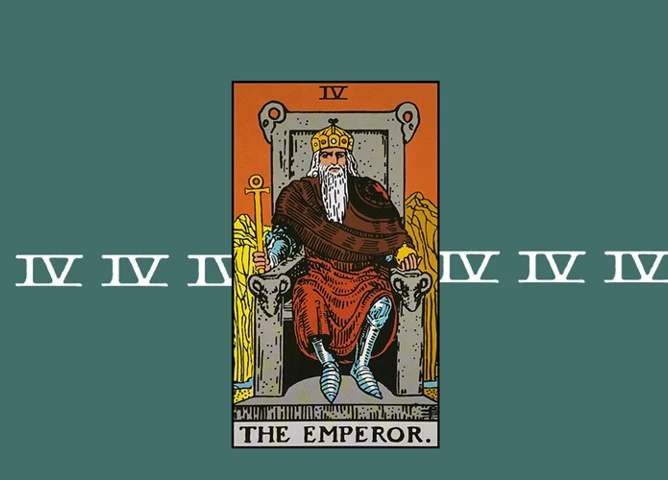The Emperor card in Tarot is a powerful symbol that holds deep meaning and significance. It represents authority, leadership, and structure in our lives. Decoding the symbolism of this card can offer valuable insights into our personal power and how we navigate the world around us. In this article, we will explore the various key elements in the Emperor card, uncover its symbolic meanings, and learn how to interpret it in Tarot readings. We will also explore its connection to astrology and numerology, as well as delve into the reversed interpretation of the card. Join us on this journey of uncovering the mysteries of the Emperor card and discover how it can bring clarity and guidance to your life.
Contents
- Overview of the Emperor Card
- Key Elements in the Emperor Card
- Symbolic Meanings of the Emperor Card
- Connection to Astrology and Numerology
- Interpreting the Emperor Card in Tarot Readings
- Emperor Card Reversed: Interpretations and Insights
- Conclusion
-
Frequently Asked Questions
- 1. What does the Emperor card represent in Tarot?
- 2. How does the Emperor card relate to astrology and numerology?
- 3. What are the key elements in the Emperor card?
- 4. What are the symbolic meanings of the Emperor card?
- 5. How can the Emperor card be interpreted in Tarot readings?
- 6. Is the Emperor card only relevant for men?
- 7. What is the significance of the Emperor’s throne?
- 8. Does the Emperor card have any connections to other Tarot cards?
- 9. What does the Emperor card reversed indicate?
- 10. How can the Emperor’s symbolism be applied in daily life?
- References
Overview of the Emperor Card
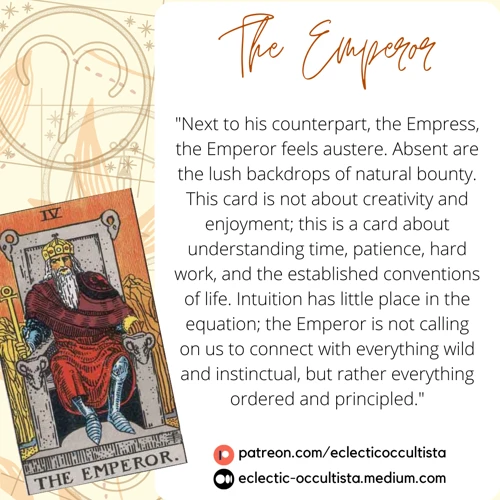
The Emperor card is the fourth card in the Major Arcana of the Tarot deck and is associated with the astrological sign of Aries. It depicts a stern-looking man seated on a throne, holding a scepter in one hand and wearing a crown. The card exudes a sense of authority, power, and control. The Emperor represents the embodiment of masculine energy and represents the archetype of the father figure or a strong leader. This card signifies structure, stability, and the establishment of order in one’s life. It emphasizes the importance of discipline, organization, and taking responsibility for one’s actions. The Emperor’s presence in a Tarot reading suggests a need to tap into one’s inner strength and embrace a leadership role. The symbolism of the Emperor card encourages us to find balance between ambition and compassion, assertiveness and understanding. It reminds us that true power comes from being in harmony with ourselves and others, and leading with wisdom and fairness.
Key Elements in the Emperor Card
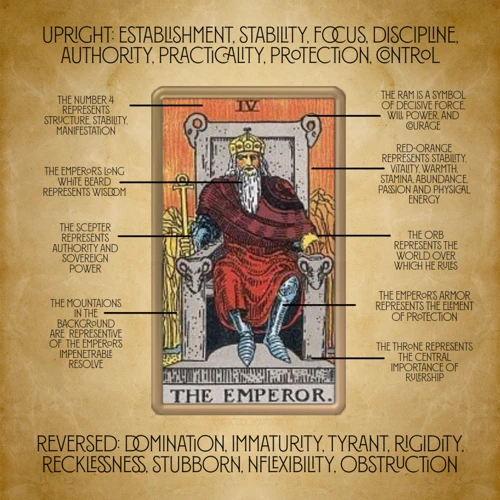
The Emperor card in Tarot contains several key elements that contribute to its symbolism and meaning. These elements include the Emperor’s throne, crown, and scepter. The throne represents the Emperor’s authority and power, symbolizing his rightful place as a leader. It signifies stability, structure, and the establishment of order. The crown worn by the Emperor represents his sovereignty and divine connection, highlighting his elevated status. It is a symbol of his wisdom and mastery. The scepter held by the Emperor signifies his leadership and control, representing his ability to make decisions and command respect. Together, these key elements emphasize the Emperor’s position of authority and his role in creating structure and maintaining control. To explore the symbolism of other Tarot cards, you can also check out the symbolism of the Empress card, which represents fertility and creativity, or the symbolic meaning of the High Priestess, associated with intuition and mysticism.
1. The Emperor’s Throne
The Emperor’s Throne is a prominent element in the Emperor card, symbolizing power, stability, and authority. The throne is often depicted as grand and imposing, representing the Emperor’s strong and unwavering reign. It serves as a symbol of the Emperor’s mastery over his domain, whether it be his personal life or the world around him. The solid and sturdy structure of the throne represents the stability and structure that the Emperor brings to any situation. It suggests that the Emperor embodies a sense of order, discipline, and control. The throne also signifies a position of leadership, suggesting that the Emperor is a figure to be respected and looked up to. Just as the throne provides support and stability, the Emperor’s presence in a Tarot reading indicates the need for strong foundations and a sense of stability in one’s life. It encourages the seeker to take charge of their circumstances and establish a solid framework to achieve their goals. The Emperor’s Throne serves as a reminder of the authority and power that comes with taking responsibility and embracing leadership in both personal and professional endeavors. By sitting on the throne, the Emperor is given a position of power and the ability to make important decisions confidently. This symbolism reminds us of the significance of having a solid foundation and structure in our lives to establish a strong sense of purpose and direction. It allows us to take control and lead with certainty, just like the Emperor on his majestic throne.
2. The Emperor’s Crown
The Emperor’s crown is a significant element in the imagery of the card. It symbolizes authority, power, and legitimacy. The crown that adorns the Emperor’s head represents his royal status and leadership role. It signifies his connection to divine wisdom and the acknowledgement of his position as a ruler. The crown often has a solid and structured design, reflecting the Emperor’s ability to bring order and stability to any situation. It may also feature precious gems or jewels, representing the Emperor’s abundance and wealth. The crown serves as a reminder of the responsibility that comes with leadership and the need to make wise and just decisions. It is a symbol of honor, respect, and the earned right to govern. The prominence of the crown in the Emperor card signifies the importance of strong leadership and the ability to assert authority in a fair and balanced manner. By wearing the crown, the Emperor assumes the role of a wise and benevolent ruler, guiding others towards success and prosperity. It serves as a reminder for individuals to embrace their own inner power and leadership abilities in their own lives. The crown also aligns with the concept of the Magician’s tools in Tarot symbolism, as both represent the ability to manifest and create reality through the understanding and mastery of one’s own power and influence.
3. The Emperor’s Scepter
The Emperor’s scepter is a key element in the symbolism of the card. It represents authority, power, and control. The scepter is a long staff or rod that the Emperor holds in his hand, signifying his dominion and ability to make decisions. The scepter is often associated with leadership and the ability to command respect and obedience. It serves as a symbol of the Emperor’s ability to enforce order and maintain structure in his realm. Just as the magician’s wand carries significance in the Tarot, the Emperor’s scepter holds similar importance in demonstrating his mastery and influence. The scepter can also represent the divine authority and wisdom bestowed upon the Emperor, signifying his connection to higher realms of knowledge and guidance. It serves as a reminder that the Emperor wields power responsibly and should use it to create a harmonious balance between control and compassion. The scepter’s symbolism ties back to the idea of leadership and the Emperor’s role in making decisions that impact not just himself but also those around him. It signifies the Emperor’s ability to rule with fairness, wisdom, and a sense of moral obligation. In Tarot readings, the presence of the Emperor’s scepter often suggests a need for the querent to embrace their own personal power and take charge of their life and responsibilities. It encourages them to assert themselves in a confident and authoritative manner and to use their influence wisely. The symbolism of the scepter highlights the importance of leadership and the potential for great impact and influence when wielded with integrity and purpose.
Symbolic Meanings of the Emperor Card
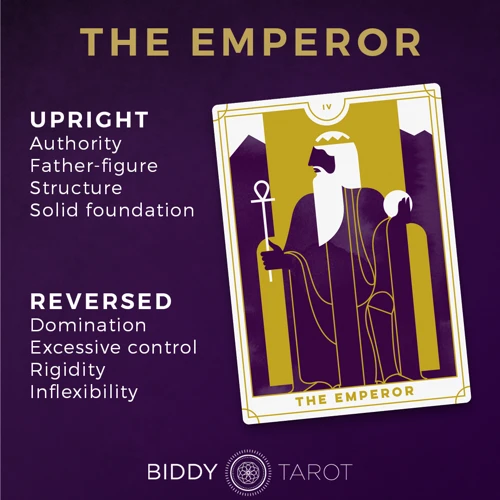
The Emperor card in Tarot holds significant symbolic meanings that reflect authority, power, and structure. Here are three key symbolic meanings associated with this card:
1. Authority and Power: The Emperor represents the embodiment of authority and power. As the ruler of his domain, he carries an air of confidence and commands respect. He symbolizes our own inner authority and encourages us to embrace our personal power and take charge of our lives.
2. Structure and Order: The Emperor signifies the importance of structure and order. He represents the need for stability and discipline in our lives. Just as the Emperor sits on his throne, he reminds us to establish a solid foundation and create a sense of stability and security in our endeavors.
3. Leadership and Control: The Emperor is the epitome of leadership and control. He encourages us to step into a leadership role and take control of our own lives. He reminds us to make decisions with confidence and assertiveness, while also considering the well-being of those around us.
The symbolic meanings of the Emperor card urge us to embrace our personal power, establish structure in our lives, and lead with wisdom and control. By embodying these qualities, we can navigate challenges and create a sense of order in both our inner and outer worlds. (To learn more about the symbolism in other Tarot cards, you can check out the significance of the magician’s tools in Tarot symbolism.)
Authority and power are key themes associated with the Emperor card in Tarot. When this card appears in a reading, it signifies a position of leadership and the ability to exert influence and control. The Emperor represents someone who possesses a strong sense of authority and who is confident in their decision-making abilities. The presence of the Emperor suggests that you have the power and capability to take charge of a situation. It encourages you to step into a position of leadership and embrace your own power. The Emperor’s role is to establish order, set boundaries, and create a sense of structure. This card reminds us that authority comes with responsibility and that it is important to use power wisely and fairly. It prompts us to take ownership of our actions and make decisions from a place of strength and confidence. The symbolism of the Emperor card highlights the significance of leadership in guiding our lives and the impact we can have when we harness our own authority. By embodying the qualities of the Emperor, you can tap into your inner strength and use your power to shape your reality and influence those around you. Through the symbolism of the Emperor card, we are reminded of the significance of leadership and the responsibility that comes with possessing authority and power. Remember, power is not about dominance, but about using your influence wisely and compassionately. (Source: Alchimisti.com)
2. Structure and Order
In the context of the Emperor card, structure and order play a vital role in its symbolic meaning. The Emperor represents the establishment of a solid foundation and a framework upon which one can build their life. The card signifies the importance of organization, discipline, and a clear set of rules or principles to guide one’s actions. Just as the Emperor sits on his throne, he represents the need for stability and a strong leadership presence in our lives. This symbolism emphasizes the significance of creating a structured environment that fosters growth and success. The Emperor card also reminds us that structure and order are not restrictive; they provide a sense of security and allow us to navigate challenges with confidence and efficiency. By maintaining a sense of structure, we can achieve our goals and bring balance to our lives. Similar to the significance of tools in the Magician card, the Emperor’s emphasis on structure and order highlights the importance of utilizing the right tools and resources to manifest our intentions successfully. This connection underscores the interconnectedness of various cards in the Tarot deck and shows how each card contributes to a more holistic understanding of our journeys.
3. Leadership and Control
Leadership and control are significant aspects of the Emperor card in Tarot. This card represents a strong and authoritative figure who knows how to take charge and make decisions. The Emperor embodies qualities of leadership, assertiveness, and the ability to maintain control in various situations. When this card appears in a reading, it suggests that the querent is being called to embrace their own leadership qualities and take charge of their life. It signifies a need for structure and order, encouraging individuals to establish clear boundaries and set goals. The Emperor reminds us that true leadership is not about dominating or exerting power over others, but rather about using our authority wisely and responsibly. It signifies a balance between assertiveness and compassion, and the ability to guide and inspire others. Just as the Magician uses their tools to create and manifest their desires, the Emperor utilizes their leadership skills and control to shape their reality and create a strong foundation for success. Embracing the symbolic meaning of the Emperor card can empower individuals to step into their own authority and navigate the challenges of life with confidence.
Connection to Astrology and Numerology
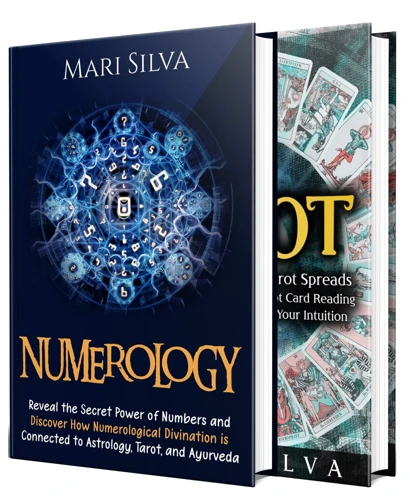
The Emperor card in Tarot has a strong connection to astrology and numerology. Astrologically, the Emperor is associated with the sign of Aries—the first sign of the zodiac. Aries is known for its assertiveness, leadership qualities, and drive for success. Just as Aries represents the beginning of the astrological year, the Emperor symbolizes the initiation of new endeavors and the manifestation of goals. Numerologically, the Emperor is linked to the number four. The number four signifies stability, structure, and practicality. It represents the solid foundation upon which we build our lives and the structuring of our ambitions. The Emperor’s association with both Aries and the number four emphasizes the card’s powerful energy and its ability to bring order and organization to chaotic situations. This connection to astrology and numerology broadens our understanding of the Emperor card and enhances its interpretations in Tarot readings. It reminds us to embrace our inner leadership qualities and use them to bring stability and structure to our lives and the lives of those around us.
Interpreting the Emperor Card in Tarot Readings
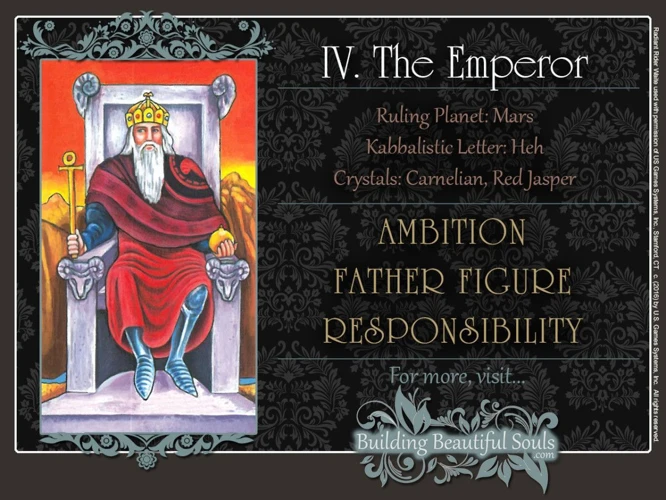
Interpreting the Emperor card in Tarot readings provides valuable insight into various aspects of one’s life. When this card appears, it often signifies a time of stability, authority, and leadership. In the context of career and ambition, the Emperor card suggests that the individual is in a position of power and should embrace their leadership qualities to achieve success. It urges them to make firm decisions, set clear goals, and take charge of their professional path. The Emperor also represents masculine energy and can indicate the need for balance between assertiveness and compassion. Additionally, the Emperor card highlights the importance of boundaries and setting limits. It prompts individuals to establish healthy boundaries in their personal and professional relationships, promoting self-discipline and maintaining control. Interpreting the Emperor card in Tarot readings reminds us of the significance of taking charge, assuming responsibility, and using our power wisely and with integrity. (For more on the symbolism of Tarot cards, visit the Significance of Magician’s Tools in Tarot Symbolism.)
1. Career and Ambition
In Tarot readings, the Emperor card holds significant meaning when it comes to career and ambition. This card represents a strong and authoritative figure in the realm of work and professional life. It signifies the qualities of leadership, assertiveness, and taking charge of one’s career trajectory. When the Emperor card appears in a Tarot reading related to career, it suggests that the individual is or needs to adopt a proactive and disciplined approach in their professional endeavors. It encourages them to embrace their inner power, make confident decisions, and take control of their professional path. The Emperor card also highlights the importance of structure and organization in one’s work life. It is a reminder to set clear goals, establish routines, and create a solid foundation for career growth. It urges individuals to tap into their ambition and take calculated risks to achieve success. This card also signifies that the individual may be in a position of authority or seek to attain such a position. It promotes qualities such as responsibility, integrity, and strategic thinking, which are essential for career advancement. The Emperor card serves as a reminder to balance ambition with compassion and ensure that personal drive and success do not come at the expense of others. This card encourages individuals to harness their leadership skills and use them to uplift and inspire those around them in the professional sphere.
2. Masculine Energy
Masculine energy is a central theme in the interpretation of the Emperor card in Tarot. This archetype signifies traditional masculine qualities such as assertiveness, strength, and confidence. The Emperor embodies the father figure, symbolizing authority, protection, and leadership. It represents the active, outward expression of power and control. However, it’s important to note that the concept of masculine energy in the Tarot does not exclusively pertain to gender. It is a symbolic representation of these qualities that can be present within anyone, regardless of gender identity. The Emperor card encourages us to tap into our inner strength and assertiveness when faced with challenges or when taking on a leadership role. It reminds us to embrace our own power and authority, making decisions based on confidence and a strong sense of self. By embodying the masculine energy of the Emperor, we can access our own assertiveness and take charge of our lives with conviction and determination.
3. Boundaries and Boundlessness
Boundaries and boundlessness are important themes associated with the Emperor card in Tarot. The Emperor represents structure and order, which inherently involve the establishment of boundaries. Boundaries serve as protective measures, allowing us to define our personal space, set limits, and maintain a sense of control. The Emperor reminds us of the need to establish healthy boundaries in our lives, both physically and emotionally. By setting boundaries, we are able to protect our own well-being and ensure that our personal and professional relationships are built on respect and mutual understanding.
At the same time, the Emperor card also reminds us to be mindful of the potential dangers of becoming too rigid and closed off. While boundaries are crucial, it’s equally important to recognize moments where flexibility and adaptability are necessary. Boundlessness refers to the ability to think beyond the confines of strict rules and regulations. It encourages us to embrace creative solutions and approach challenges with an open mind.
In Tarot readings, the presence of the Emperor card suggests the need to find balance between maintaining boundaries and exploring new possibilities. It invites us to examine our own limitations, question if they are serving us or holding us back, and be willing to expand our perspective when necessary. By finding the equilibrium between boundlessness and established boundaries, we can cultivate a sense of personal power, growth, and fulfillment in our lives.
Emperor Card Reversed: Interpretations and Insights
When the Emperor card appears in reverse in a Tarot reading, it indicates a disruption or imbalance in the energy of authority and power. This reversal may suggest a lack of control, a misuse of power, or a struggle with authority figures. It can indicate a rebellion against traditional structures or a rebellion within oneself. In a career reading, the reversed Emperor card may indicate a lack of leadership or difficulties with management. It could suggest a need to reassess one’s approach to power dynamics in the workplace. In relationships, the reversed Emperor card could signify a power struggle or a loss of control. It may point to a need for better communication and compromise. On a personal level, the reversed Emperor card can indicate a lack of discipline or a tendency to be too rigid and inflexible. It could be a reminder to find a balance between structure and adaptability. The Emperor card reversed invites introspection and urges us to examine how we wield and respond to power, reminding us that true strength comes from humility and the ability to listen and learn from others.
Conclusion
In conclusion, the Emperor card in Tarot represents authority, power, and structure. It serves as a reminder for us to tap into our inner strength and embrace leadership roles in our lives. The symbolism of the Emperor card signifies the importance of discipline, organization, and taking responsibility for our actions. By embodying the qualities of the Emperor, we can establish order and stability in our lives. The Emperor card also highlights the balance between ambition and compassion, assertiveness and understanding. It teaches us that true power comes from leading with wisdom and fairness. When interpreting the Emperor card in Tarot readings, it can provide insights into career and ambition, as well as aspects of masculine energy. It also serves as a reminder to set boundaries and find balance between control and freedom. By understanding the symbolism and meanings behind the Emperor card, we can gain valuable insights, guidance, and clarity in our lives. So, embrace your own inner Emperor and step into your power with confidence and authority.
Frequently Asked Questions
1. What does the Emperor card represent in Tarot?
The Emperor card represents authority, leadership, structure, and power in Tarot. It symbolizes the embodiment of masculine energy and the archetype of a strong, disciplined leader.
2. How does the Emperor card relate to astrology and numerology?
The Emperor card is associated with the astrological sign of Aries and the numerological number 4. Aries represents assertiveness and ambition, while the number 4 signifies stability, organization, and practicality.
3. What are the key elements in the Emperor card?
The key elements in the Emperor card include the Emperor’s throne, crown, and scepter. These symbols represent authority, power, and control.
4. What are the symbolic meanings of the Emperor card?
The Emperor card symbolizes authority, power, structure, order, discipline, and leadership. It also represents the balance between ambition and compassion, and the importance of fair and wise decision-making.
5. How can the Emperor card be interpreted in Tarot readings?
The Emperor card can be interpreted as a sign of career advancement, ambition, and taking charge of one’s life. It can also indicate the need for structure, organization, and assertiveness to achieve goals.
6. Is the Emperor card only relevant for men?
No, the Emperor card represents masculine energy, but it is not exclusively for men. It symbolizes qualities like leadership, strength, and assertiveness that can be embodied by individuals of any gender.
7. What is the significance of the Emperor’s throne?
The Emperor’s throne represents a solid foundation, stability, and the establishment of order. It signifies the Emperor’s authority and his role as a leader, making decisions with wisdom and responsibility.
8. Does the Emperor card have any connections to other Tarot cards?
Yes, the Emperor card is often paired with the Empress card. While the Emperor represents masculine energy and structure, the Empress embodies feminine energy, fertility, and creativity. Together, they represent a balanced and harmonious union of energies.
9. What does the Emperor card reversed indicate?
When the Emperor card appears reversed, it may suggest a misuse of power, a lack of structure, or difficulties in maintaining control. It may also indicate a need to reassess leadership roles or address issues of dominance and authority.
10. How can the Emperor’s symbolism be applied in daily life?
The Emperor’s symbolism reminds us to embrace our inner strength, establish structure and order, and take on leadership roles when necessary. It prompts us to find a balance between assertiveness and compassion, creating a harmonious environment where authority is used wisely and fairly.
